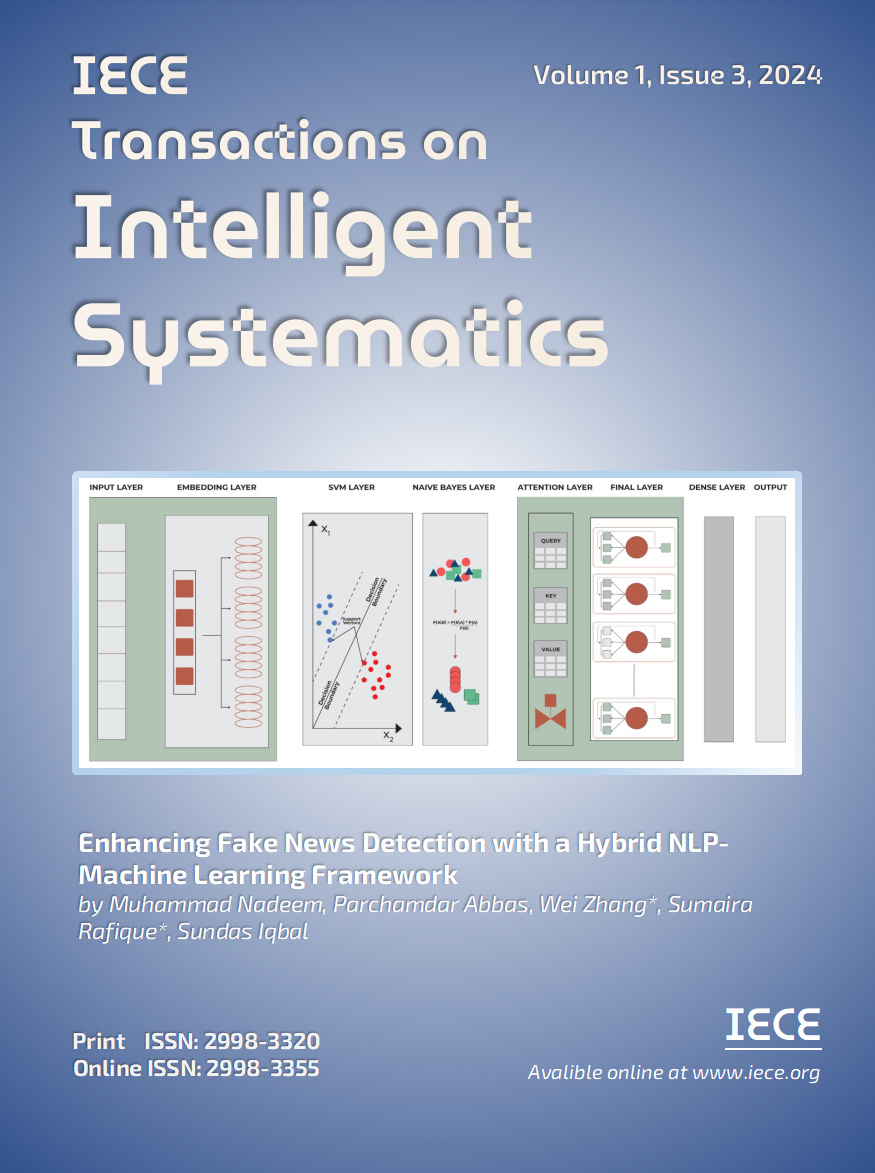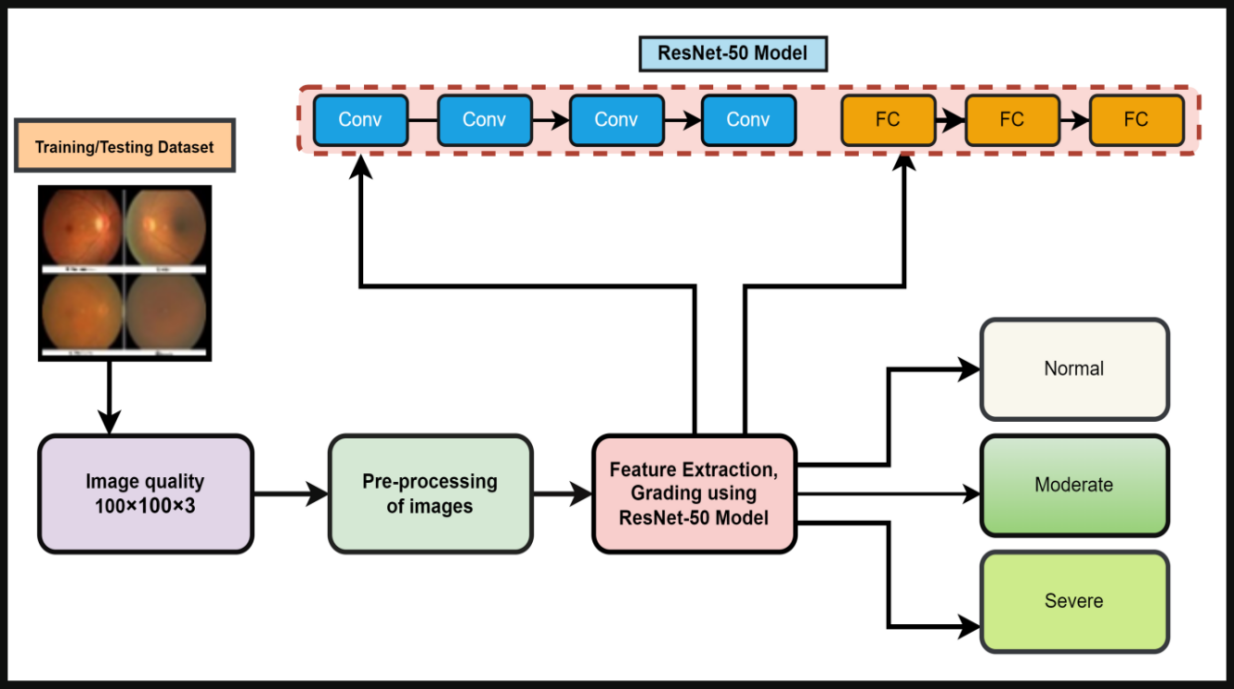IECE Transactions on Intelligent Systematics
ISSN: 2998-3355 (Online) | ISSN: 2998-3320 (Print)
Email: [email protected]


 Submit Manuscript
Edit a Special Issue
Submit Manuscript
Edit a Special Issue

[1] Cvekl, A., & Vijg, J. (2024). Aging of the eye: Lessons from cataracts and age-related macular degeneration. Ageing Research Reviews, 102407.
[2] Khalil, I., Mehmood, A., Kim, H., & Kim, J. (2024). OCTNet: A Modified Multi-Scale Attention Feature Fusion Network with InceptionV3 for Retinal OCT Image Classification. Mathematics, 12(19), 3003.
[3] Salmon, J. F. (2019). Kanski’s clinical ophthalmology e-book: a systematic approach. Elsevier Health Sciences.
[4] Junayed, M. S., Islam, M. B., Sadeghzadeh, A., & Rahman, S. (2021). CataractNet: An automated cataract detection system using deep learningfor fundus images. IEEE access, 9, 128799-128808.
[5] Khan, H., Haq, I. U., Munsif, M., Mustaqeem, Khan, S. U., & Lee, M. Y. (2022). Automated wheat diseases classification framework using advanced machine learning technique. Agriculture, 12(8), 1226.
[6] Raj, T. S., & Priyadharshini, V. (2024). Eyes on the Barriers and Challenges: Visually Impaired Women on Activities of Daily Living. Shanlax International Journal of Arts, Science and Humanities. https://doi. org/10.34293/sijash. v11i3, 6718.
[7] Akbar, W., Haq, M. I. U., Soomro, A., Daudpota, S. M., Imran, A. S., & Ullah, M. (2023, March). Automated Report Generation: A GRU Based Method for Chest X-Rays. In 2023 4th International Conference on Computing, Mathematics and Engineering Technologies (iCoMET) (pp. 1-6). IEEE.
[8] Anyolo, F. (2008). Factors influencing cataract surgical services at Oshakati intermediate hospital in the Northern vision 2020 district of Namibia. Royal tropical institute (KIT).
[9] Hassan, B., Ahmed, R., Li, B., Noor, A., & Hassan, Z. U. (2019). A comprehensive study capturing vision loss burden in Pakistan (1990-2025): Findings from the Global Burden of Disease (GBD) 2017 study. PloS one, 14(5), e0216492.
[10] Vasavada, A. R., Mamidipudi, P. R., & Sharma, P. S. (2004). Morphology of and visual performance with posterior subcapsular cataract. Journal of Cataract & Refractive Surgery, 30(10), 2097-2104.
[11] Lenhart, P. D., & Lambert, S. R. (2022). Current management of infantile cataracts. Survey of ophthalmology, 67(5), 1476-1505.
[12] Gupta, V., Jaiswal, A., Choudhury, T., & Sachdeva, N. (2022). Cataract Detection on Ocular Fundus Images Using Machine Learning. In Emerging Technologies in Data Mining and Information Security: Proceedings of IEMIS 2022, Volume 2 (pp. 185-192). Singapore: Springer Nature Singapore.
[13] Zhang, X. Q., Hu, Y., Xiao, Z. J., Fang, J. S., Higashita, R., & Liu, J. (2022). Machine learning for cataract classification/grading on ophthalmic imaging modalities: a survey. Machine Intelligence Research, 19(3), 184-208.
[14] Koh, J. E., Ng, E. Y., Bhandary, S. V., Laude, A., & Acharya, U. R. (2018). Automated detection of retinal health using PHOG and SURF features extracted from fundus images. Applied Intelligence, 48, 1379-1393.
[15] Ur Rehman, I., Ullah, I., Khan, H., Guellil, M. S., Koo, J., Min, J., ... & Lee, M. Y. (2024). A comprehensive systematic literature review of ML in nanotechnology for sustainable development. Nanotechnology Reviews, 13(1), 20240069.
[16] Canatan, A. N. (2024). RESTORING SIGHT: EXPLORING CATARACTS AS THE LEADING TREATABLE CAUSE OF BLINDNESS: A NARRATIVE REVIEW.
[17] Arrigo, A., Leveziel, N., Briant, P. S., Vos, T., Resnikoff, S., Taylor, H. R., & Sedighi, T. (2024). Global estimates on the number of people blind or visually impaired by cataract: a meta-analysis from 2000 to 2020. diabetes, 5(8), 9.
[18] Khairallah, M., Kahloun, R., Bourne, R., Limburg, H., Flaxman, S. R., Jonas, J. B., ... & Vision Loss Expert Group of the Global Burden of Disease Study. (2015). Number of people blind or visually impaired by cataract worldwide and in world regions, 1990 to 2010. Investigative ophthalmology & visual science, 56(11), 6762-6769.
[19] World Health Organization. (2000). Elimination of avoidable visual disability due to refractive errors: report of an informal planning meeting, Geneva, 3-5 July 2000 (No. WHO/PBL/00.79). World Health Organization.
[20] McCormick, I., Butcher, R., Evans, J. R., Mactaggart, I. Z., Limburg, H., Jolley, E., ... & Zhang, X. J. (2022). Effective cataract surgical coverage in adults aged 50 years and older: estimates from population-based surveys in 55 countries. The Lancet Global Health, 10(12), e1744-e1753.
[21] Shaheen, I., & Akram, M. U. (2017, July). An integrated framework for clinical grading of cataract. In 2017 1st International Conference on Next Generation Computing Applications (NextComp) (pp. 92-97). IEEE.
[22] Zhang, H., Niu, K., Xiong, Y., Yang, W., He, Z., & Song, H. (2019). Automatic cataract grading methods based on deep learning. Computer methods and programs in biomedicine, 182, 104978.
[23] Song, W., Cao, Y., Qiao, Z., Wang, Q., & Yang, J. J. (2019, July). An improved semi-supervised learning method on cataract fundus image classification. In 2019 IEEE 43rd annual computer software and applications conference (COMPSAC) (Vol. 2, pp. 362-367). IEEE.
[24] Jagadale, A. B., Sonavane, S. S., & Jadav, D. V. (2019, April). Computer aided system for early detection of nuclear cataract using circle Hough transform. In 2019 3rd international conference on trends in electronics and informatics (ICOEI) (pp. 1009-1012). IEEE.
[25] Cao, L., Li, H., Zhang, Y., Zhang, L., & Xu, L. (2020). Hierarchical method for cataract grading based on retinal images using improved Haar wavelet. Information Fusion, 53, 196-208.
[26] Harini, V., & Bhanumathi, V. (2016, April). Automatic cataract classification system. In 2016 international conference on communication and signal processing (ICCSP) (pp. 0815-0819). IEEE.
[27] Askarian, B., Ho, P., & Chong, J. W. (2021). Detecting cataract using smartphones. IEEE Journal of Translational Engineering in Health and Medicine, 9,1-10.
[28] Hossain, M. R., Afroze, S., Siddique, N., & Hoque, M. M. (2020, June). Automatic detection of eye cataract using deep convolution neural networks (DCNNs). In 2020 IEEE region 10 symposium (TENSYMP) (pp. 1333-1338). IEEE.
[29] Rana, J., & Galib, S. M. (2017, December). Cataract detection using smartphone. In 2017 3rd international conference on electrical information and communication technology (EICT) (pp. 1-4). IEEE.
[30] Guo, L., Yang, J. J., Peng, L., Li, J., & Liang, Q. (2015). A computer-aided healthcare system for cataract classification and grading based on fundus image analysis. Computers in Industry, 69, 72-80.
[31] Yang, J. J., Li, J., Shen, R., Zeng, Y., He, J., Bi, J., ... & Wang, Q. (2016). Exploiting ensemble learning for automatic cataract detection and grading. Computer methods and programs in biomedicine, 124, 45-57.
[32] Pratap, T., & Kokil, P. (2019). Computer-aided diagnosis of cataract using deep transfer learning. Biomedical Signal Processing and Control, 53, 101533.
[33] Xiong, Y., He, Z., Niu, K., Zhang, H., & Song, H. (2018, December). Automatic cataract classification based on multi-feature fusion and SVM. In 2018 IEEE 4th International Conference on Computer and Communications (ICCC) (pp. 1557-1561). IEEE.
[34] Porwal, P., Pachade, S., Kamble, R., Kokare, M., Deshmukh, G., Sahasrabuddhe, V., & Meriaudeau, F. (2018). Indian diabetic retinopathy image dataset (IDRiD): a database for diabetic retinopathy screening research. Data, 3(3), 25.
[35] Zhang, Z., Liu, J., Yin, F., Lee, B. H., Wong, D. W. K., & Sung, K. R. (2013, June). ACHIKO-K: Database of fundus images from glaucoma patients. In 2013 IEEE 8th conference on industrial electronics and applications (ICIEA) (pp. 228-231). IEEE.
[36] Li, N., Li, T., Hu, C., Wang, K., & Kang, H. (2021). A benchmark of ocular disease intelligent recognition: One shot for multi-disease detection. In Benchmarking, Measuring, and Optimizing: Third BenchCouncil International Symposium, Bench 2020, Virtual Event, November 15–16, 2020, Revised Selected Papers 3 (pp. 177-193). Springer International Publishing.
[37] Nappa, A., Rafique, M. Z., & Caballero, J. (2015). The MALICIA dataset: identification and analysis of drive-by download operations. International Journal of Information Security, 14, 15-33.
[38] Akbar, W., Soomro, A., Ullah, M., Haq, M. I. U., Khan, S. U., & Shah, T. A. (2023, March). Performance Evaluation of Deep Learning Models for Leaf Disease Detection: A Comparative Study. In 2023 4th International Conference on Computing, Mathematics and Engineering Technologies (iCoMET) (pp. 01-05). IEEE.
[39] Zhang, L., Bian, Y., Jiang, P., & Zhang, F. (2023). A transfer residual neural network based on ResNet-50 for detection of steel surface defects. Applied Sciences, 13(9), 5260.
[40] Cong, S., & Zhou, Y. (2023). A review of convolutional neural network architectures and their optimizations. Artificial Intelligence Review, 56(3), 1905-1969.
[41] Akbar, W., Soomro, A., Ghanghro, S. A., Haq, M. I. U., & Ullah, M. (2023, January). Performance Evaluation of Deep Learning Models for Breast Cancer Classification. In 2023 IEEE International Conference on Emerging Trends in Engineering, Sciences and Technology (ICES&T) (pp. 1-4). IEEE.
[42] Gao, X., Li, H., Lim, J. H., & Wong, T. Y. (2011, September). Computer-aided cataract detection using enhanced texture features on retro-illumination lens images. In 2011 18th IEEE International Conference on Image Processing (pp. 1565-1568). IEEE.
[43] Fuadah, Y. N., Setiawan, A. W., & Mengko, T. L. R. (2015, May). Performing high accuracy of the system for cataract detection using statistical texture analysis and K-Nearest Neighbor. In 2015 International Seminar on Intelligent Technology and Its Applications (ISITIA) (pp. 85-88). IEEE.
[44] Zhang, L., Li, J., Han, H., Liu, B., Yang, J., & Wang, Q. (2017, May). Automatic cataract detection and grading using deep convolutional neural network. In 2017 IEEE 14th international conference on networking, sensing and control (ICNSC) (pp. 60-65). IEEE.
[45] Ran, J., Niu, K., He, Z., Zhang, H., & Song, H. (2018, August). Cataract detection and grading based on combination of deep convolutional neural network and random forests. In 2018 international conference on network infrastructure and digital content (IC-NIDC) (pp. 155-159). IEEE.
[46] Sigit, R., Triyana, E., & Rochmad, M. (2019, October). Cataract detection using single layer perceptron based on smartphone. In 2019 3rd International Conference on Informatics and Computational Sciences (ICICoS) (pp. 1-6). IEEE.
[47] Khan, M. S. M., Ahmed, M., Rasel, R. Z., & Khan, M. M. (2021, May). Cataract detection using convolutional neural network with VGG-19 model. In 2021 IEEE World AI IoT Congress (AIIoT) (pp. 0209-0212). IEEE.
[48] Lahmar, C., & Idri, A. (2022). On the value of deep learning for diagnosing diabetic retinopathy. Health and Technology, 1-17.
[49] Pan, Y., Liu, J., Cai, Y., Yang, X., Zhang, Z., Long, H., ... & Tan, Z. (2023). Fundus image classification using Inception V3 and ResNet-50 for the early diagnostics of fundus diseases. Frontiers in Physiology, 14, 1126780.
[50] Puchaicela-Lozano, M. S., Zhinin-Vera, L., Andrade-Reyes, A. J., Baque-Arteaga, D. M.,Cadena-Morejón, C., Tirado-Espín, A., ... & Meneses, F. V. (2023). Deep Learning for Glaucoma Detection: R-CNN ResNet-50 and Image Segmentation. Journal of Advances in Information Technology, 14(6), 1186-1197.
[51] Xiong, L., Li, H., & Xu, L. (2017). An approach to evaluate blurriness in retinal images with vitreous opacity for cataract diagnosis. Journal of healthcare engineering, 2017(1), 5645498.
[52] Bragança, C. P., Torres, J. M., Soares, C. P. D. A., & Macedo, L. O. (2022, November). Detection of glaucoma on fundus images using deep learning on a new image set obtained with a smartphone and handheld ophthalmoscope. In Healthcare (Vol. 10, No. 12, p. 2345). MDPI.
[53] Li, L., Xu, M., Liu, H., Li, Y., Wang, X., Jiang, L., ... & Wang, N. (2019). A large-scale database and a CNN model for attention-based glaucoma detection. IEEE transactions on medical imaging, 39(2), 413-424.
IECE Transactions on Intelligent Systematics
ISSN: 2998-3355 (Online) | ISSN: 2998-3320 (Print)
Email: [email protected]

Portico
All published articles are preserved here permanently:
https://www.portico.org/publishers/iece/